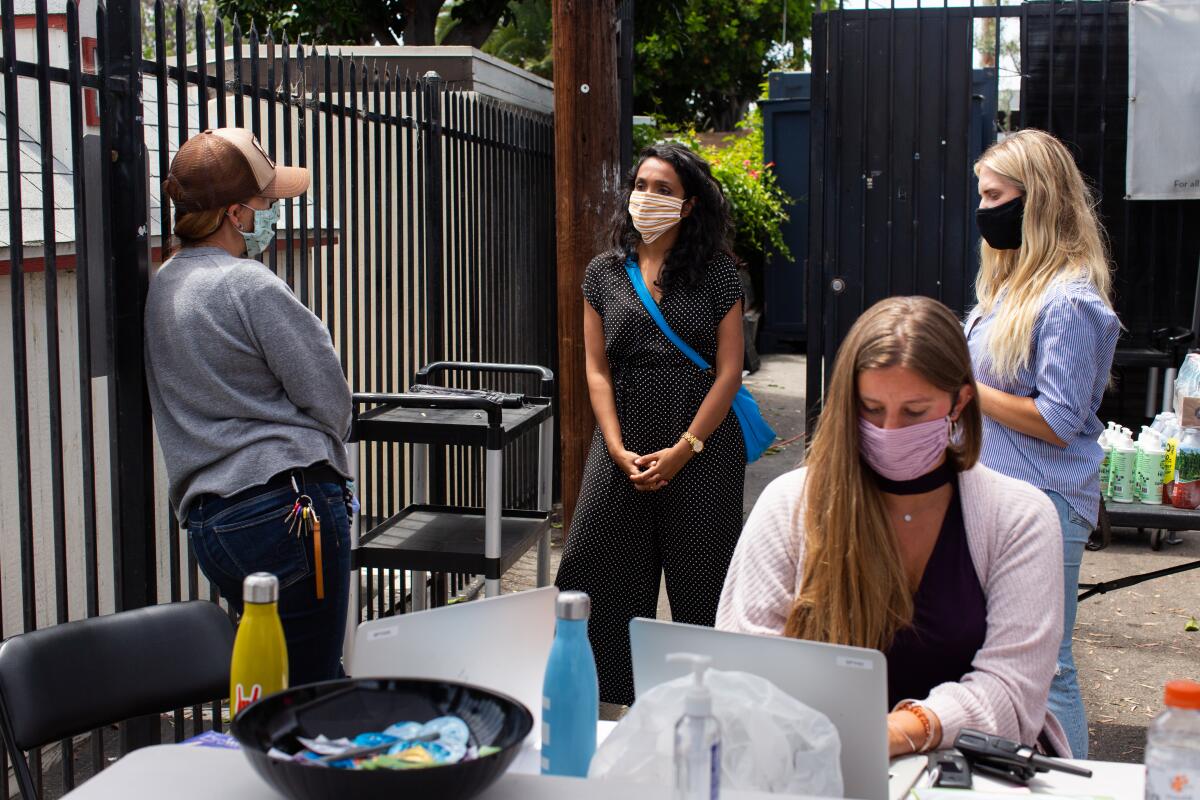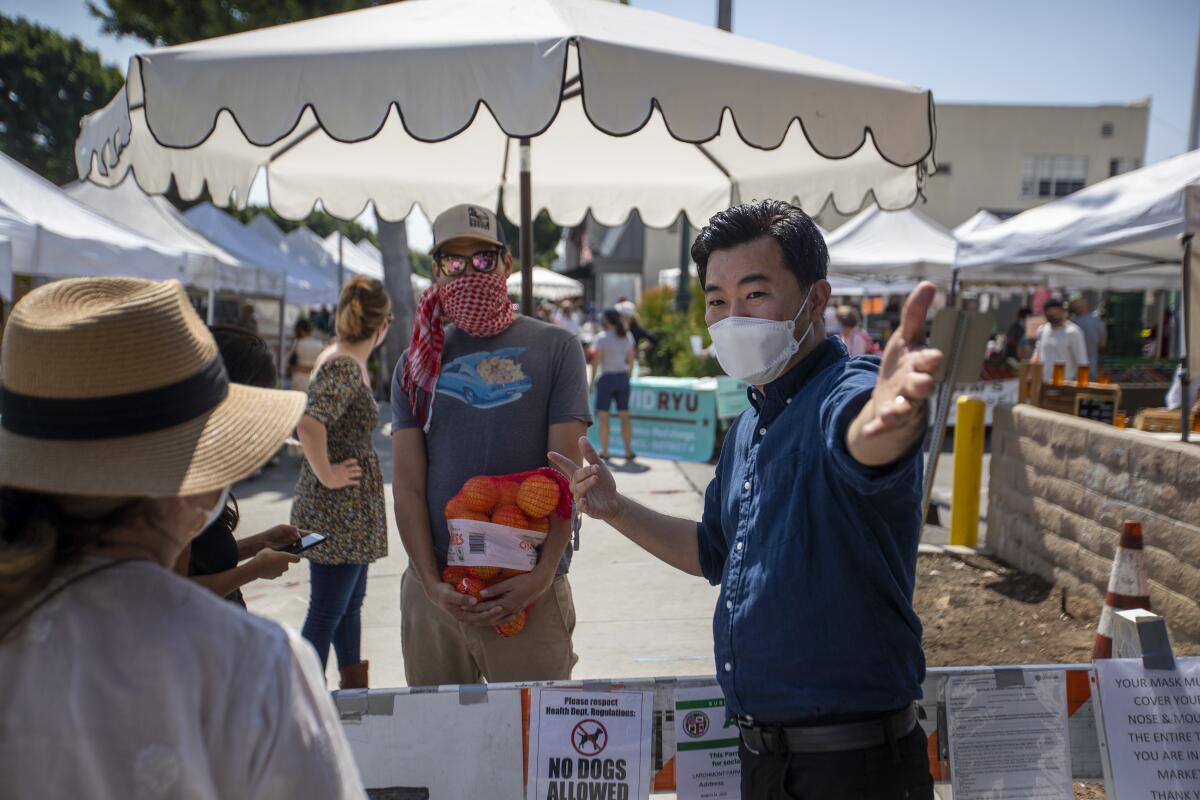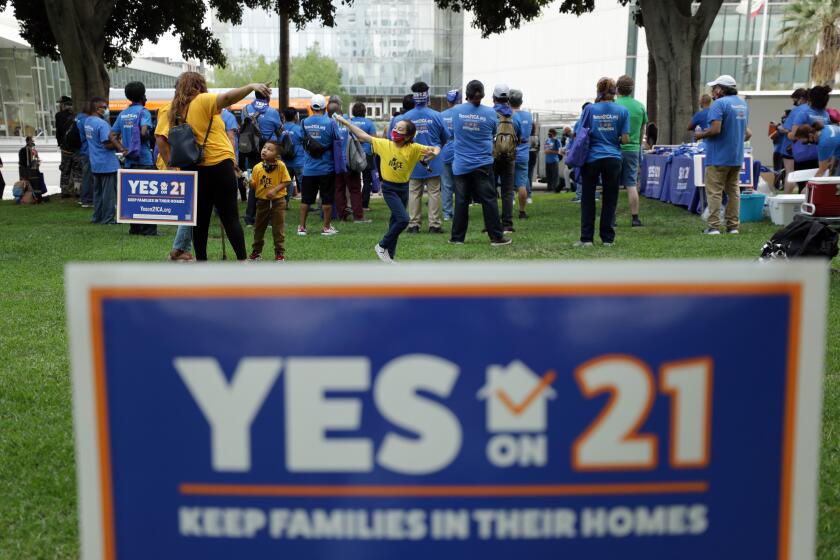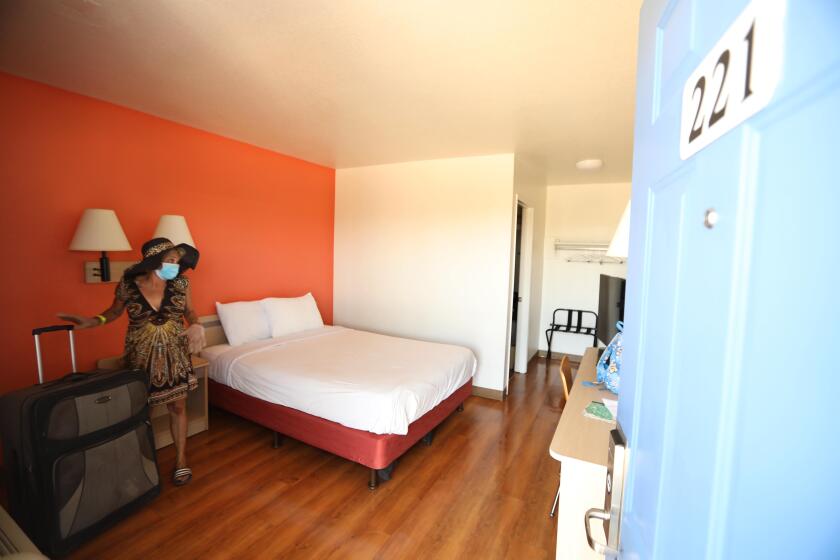So much for shaking hands and kissing babies: How COVID-19 is reshaping L.A. campaigns

- Share via
Knocking on doors. Mingling at meet-and-greets. Crowding into campaign offices with volunteers.
Weeks ahead of the November election, many of the familiar rituals of stumping for votes are off the table during the COVID-19 pandemic, drastically changing what it looks like to run for office in Los Angeles.
Candidates are debating over video calls, rather than in community centers or church halls. Many politicians are barely using — or forgoing entirely — campaign offices that would ordinarily be full of volunteers, yard signs and cold pizza. And door knocking, long revered as the gold standard for reaching out to voters, has been called off by many candidates.
It’s unclear how such changes will affect the upcoming contests in Los Angeles, where spots on the City Council, the county Board of Supervisors and the Los Angeles Unified school board are up for grabs.
“It’s a brand new world,” said Eric Hacopian, a political consultant who is not working on any L.A. city or county campaigns in November. “You can’t make predictions when there’s no patterns to go off of.”
For council candidates, the pandemic only adds another layer of uncertainty to an election that is already unusual: This is the first time those races will coincide with a presidential election, a shift expected to radically increase turnout.
A new UC Berkeley poll shows 37% of voters support Proposition 21 to expand rent control in the state.
The biggest change, for most campaigns, is the elimination of door knocking. In the race to represent an L.A. council district spanning from Sherman Oaks to Silver Lake, both Councilman David Ryu and his opponent Nithya Raman have credited door knocking for past successes — Ryu for the 2015 upset that first got him onto the council as a City Hall outsider, Raman for a strong showing in the March primary that forced the councilman into an unusual runoff.
Ryu campaign manager Julia Duncan said that although their volunteers miss the chance to talk face to face with voters, many people seem to be more receptive to phone calls.
“People are home. Maybe they’re bored. They may be more willing to pick up the phone and have a conversation with a stranger,” Duncan said.

Other campaign events have migrated online: Raman, the nonprofit executive running against Ryu, has held online volunteer trainings and fundraisers — including a “virtual reunion” with cast members from the television show “Parks and Recreation.” State Sen. Holly Mitchell, who is running for county supervisor against L.A. City Councilman Herb Wesson, said that moving her meet-and-greets online has had an unexpected upside.
“If somebody is going to show up at an event for you, they probably already know you,” Mitchell said, mentioning usual barriers such as finding child care and fighting traffic. “But via Zoom, if your friend says, ‘Hey, I heard about this woman, do you want to meet her?’ you might be more inclined to learn about the campaign.”
Moving that politicking online, however, can come at the cost of some of the usual campaign fanfare and camaraderie. Michael Trujillo, a political consultant advising L.A. school board candidates Marilyn Koziatek and Tanya Franklin, said both campaigns plan to try to recapture that excitement through car caravans with signs and honking.
“Everyone’s been stuck at home, so you try to be creative and get them out of the house in a way that’s fun and safe,” he said, describing the caravans as an “old school” tactic with renewed relevance amid the pandemic.
Campaigns are also setting up “text parties” on Zoom for volunteers who are texting voters, allowing them to easily consult campaign leaders and share information when voters have unexpected questions, Trujillo said.
And County Supervisor Mark Ridley-Thomas, who is running for a Crenshaw-to-Koreatown council seat, took his September kickoff rally to Zoom — a virtual event emceed by a KJLH radio host that included remarks from Rep. Karen Bass.
“It still felt, at least for me, that it captured the essence of a kickoff — of being part of something,” said Fernando Ramirez, campaign manager for Ridley-Thomas.
Meanwhile, Ridley-Thomas’ opponent, attorney Grace Yoo, is taking an unusual step for candidates in the COVID-19 era: continuing to knock on doors to reach voters. Yoo said she wears a mask and keeps her distance when residents step out to talk. So far, she said, the reaction has been overwhelmingly positive.
“Maybe there were some people at home that just didn’t open the door — but I think some were really happy to see me, because they haven’t had too many human interactions,” Yoo said.
Some candidates have emphasized their handling of the crisis as they seek office: Wesson campaign advisor John Shallman said the L.A. councilman, who is seeking to become a county supervisor, scaled back more traditional campaigning and “turned what would have been his campaign into a community service program,” handing out food, diapers and masks.
And if some of those masks bear his name? “Campaigns can give swag to people — we’re doing things people can actually use,” Shallman said. “He’s decided to spend his time in the community, working to get folks what they need to survive.”
After reaching less than 30% of its goal to shelter homeless people who are vulnerable to the coronavirus, Project Roomkey is starting to phase out in the face of funding uncertainty.
Hacopian said that questions of campaign tactics will probably be “marginal issues” compared with a bigger change tied to the pandemic: more people voting by mail. That will probably speed up the timetable for candidates to get out their messages to Angelenos who are mailing in ballots, especially as voters are urged to act early because of postal delays, he said.
People “may vote quite early, before you’ve even had a chance to reach them,” said Mark A. Peterson, professor of public policy, political science and law at UCLA Luskin School of Public Affairs.
Peterson added that it’s unclear how the ongoing pressures of the pandemic will shape decisions about local candidates, including whether voters will take incumbent politicians to task for L.A.’s handling of the COVID-19 threat. On the flip side, Raman campaign co-manager Meghan Choi said she feared that the loss of face-to-face talks could hurt challengers.
“If you’re a grass-roots campaign and one of your strongest assets is engaging voters and turning out new people, it can be a little harder,” Choi said. “Nothing beats a face-to-face conversation.”
More to Read
Sign up for Essential California
The most important California stories and recommendations in your inbox every morning.
You may occasionally receive promotional content from the Los Angeles Times.













